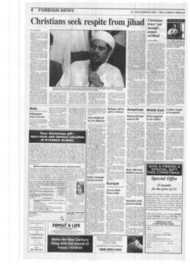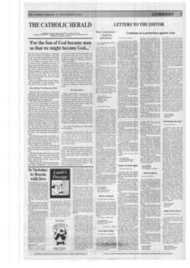Page 2, 21st December 2001
Page 2

Report an error
Noticed an error on this page?If you've noticed an error in this article please click here to report it.
Tags
Share
Related articles
Church Deplores Law Lords’ ‘shocking’ Ruling In Favour Of...
Mps Back Wider Creation Of Babies For Spare Parts
Pro-life Group Mounts Legal Challenge Against `designer...
Bishops Oppose Designer Babies Decision
Hfea In Next Stage To A Eugenic Future
Church attacks moves to allow designer babies
Simon Caldwell reports on the impact of the decision to allow the creation of babies for 'spare parts' A DECISION to relax the rules on the creation of designer babies has come under fire from the Catholic Church.
The Linacre Centre for Health Care Ethics, the bioethical institute of the Catholic Church in England and Wales and one of the leading institutes of its kind in Europe, has criticised the Human Fertilisation and Embryology Authority (HFEA) for its decision last week to allow the creation of babies for "spare parts".
The HFEA announced it would allow the creation of test tube babies to provide stem cells for a sibling who was suffering a severe or life-threatening illness.
The move, however, has been criticised by the Linacre Centre because it says it involves processes which create and destroy human life and which promote "damaging attitudes to children".
Dr Helen Watt, the director, said: "It is more of the same — it is more of what we have seen in IVF [in vitro fertilisation], which is the production of multiple embryos followed by screening of some embryos who are then thrown away.
"IVF already involves a lot of quality control, which is not surprising since it is very much a production procedure. IVF is damaging to attitudes to children and this is just more evidence of this."
The procedure permitted by the HFEA involves the selection of healthy test tube embryos that match the tissue type of the sibling.
The embryo will be implanted in the mother and as it develops stem cells, which can be grown into almost any type of human cell, will be extracted from the baby's umbilical cord and used to treat siblings.
Dr Simon Fishel, scientific director of the Park Hospital, Nottingham, has already made an application for a licence to the HFEA in order to select an embryonic sibling of a child who is afflicted by a potentially fatal blood disorder.
The only alternative treatment is a bone marrow transplant but neither the child's parents nor any of their four children provide a match.
The new procedure involves the creation of a number of embryos in the laboratory then tests being carried out using preimplantation genetic diagnosis (PGD) to find a match. The surplus embryos would be discarded.
Ruth Deech, HFEA chairman, said: "We have considered the ethical, medical and technical implications of this treatment very carefully indeed.
"Were POD is already being undertaken we can see how the use of tissue typing to save the life of a sibling could be justified. We would see this happening only in very rare circumstances and under strict controls."
However, Lord Winston, a pioneer of POD, said he thought the authority's decision had gone too far. "I fear it is treating the offspring to be born as a commodity," he said.
His fears were echoed by Nick Harris, the senior researcher with Life, the pro-life counselling charity.
He said: "Whilst curing an older sibling of a poten tially life-threatening illness is a noble aim, our concern (and the HFEA's) must also be for any child created by this process. Life firmly believes that this ruling cannot be in the resulting child's best interests, and that the I-IFEA has made a very bad decision.
"All children should be accepted and loved unconditionally. Any child resulting from this procedure will be chosen and accepted only on condition that they can provide tissue for another person."
He added: "Life calls on the Government to implement a major re-evaluation of the HFEA and the 1990 Human Fertilisation and Embryology Act.
"As the recent High Court ruling on cloning and the resulting emergency legislation proved, biotechnology is moving very quickly and the public is losing confidence in science and our ability to apply proper frameworks to it.
"We need a wide-ranging review of all aspects of new reproductive technology and we need it now."
blog comments powered by Disqus













